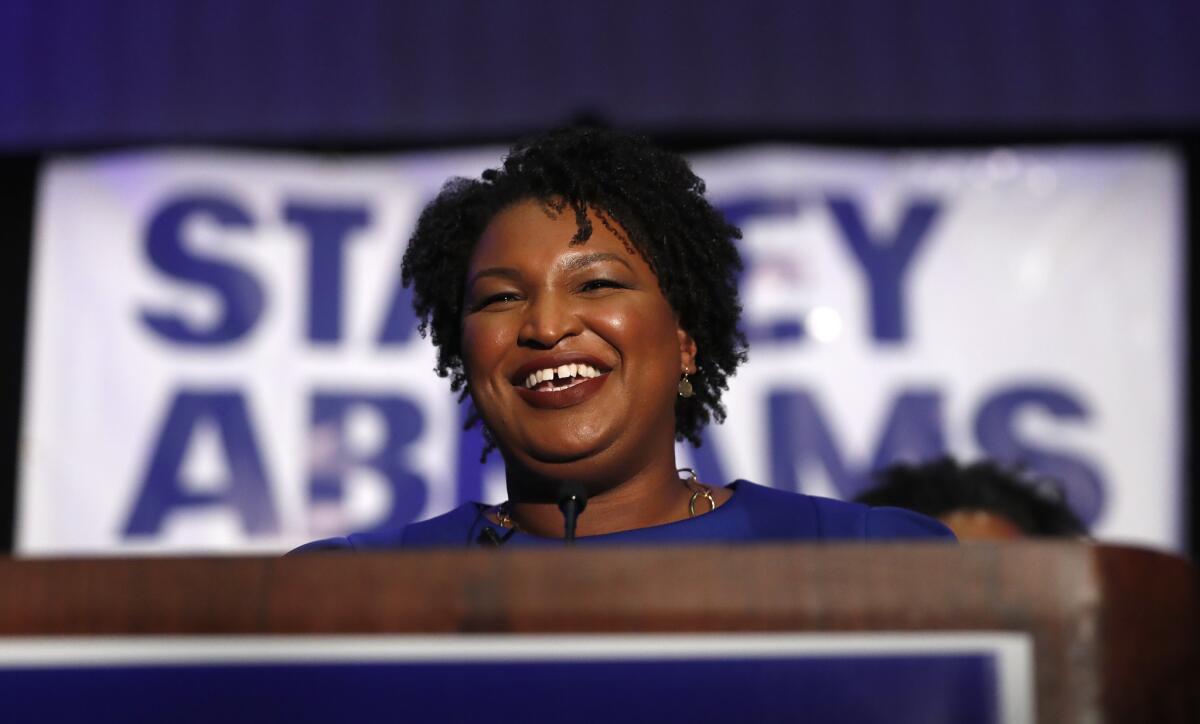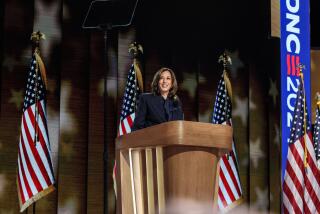‘Of course I want it.’ Stacey Abrams says she would be an excellent running mate for Joe Biden

Potential vice presidential picks typically act coy when asked about their political ambitions, demurely expressing their honor at even being considered while saying they remain focused on their day job. Not Stacey Abrams.
“I would be an excellent running mate,” the Georgia Democrat told Elle magazine, before explaining why her biography and ability to attract a broad band of voters make her an ideal partner for Joe Biden. “If I am selected, I am prepared and excited to serve.”
Earlier this year, Abrams said it would be wrong to engage in a pretense about her goals.
“It would be doing a disservice to every woman of color, every woman of ambition, every child who wants to think beyond their known space for me to say no or to pretend, ‘Oh, no, I don’t want it,’” she said when asked about being a vice presidential candidate on ABC’s “The View” in February. “Of course I want it. Of course I want to serve America. Of course I want to be a patriot and do this work.”
That was shortly after she told the politics and sports data website FiveThirtyEight that she expected to be elected president within the next 20 years.
Abrams’ rivals for the vice presidential spot have an edge because they are mostly elected officials, well known for their past experiences, their unsuccessful presidential campaigns or their leading role in the coronavirus crisis.
Abrams, 46, doesn’t command their platforms. But she is a Democrat popular with her party’s establishment and its grass roots, and a prodigious fundraiser. She has also never been shy about her political ambitions. At 18, she predicted she would be elected governor of Georgia one day, and in 2018, she came very close.
The state last elected a Democratic governor in 1998. Abrams lost the job by about 50,000 votes to Republican Brian Kemp in an election that she and her supporters argue was marred by voting irregularities. Kemp was the secretary of state when he was on the ballot, overseeing an election when questions were raised about large numbers of voters being declared ineligible or having their registrations delayed.
Many Americans know Abrams because of that near-win, which generated an enormous amount of enthusiasm among Democrats. Her bid drew the support of former President Obama, Sen. Bernie Sanders, former Democratic presidential nominee Hillary Clinton and Oprah Winfrey. The attention brought her national prominence.
Since then, Abrams has worked to fight voter disenfranchisement, and she was selected in 2019 to deliver the Democratic response to President Trump’s State of the Union address.
All of this resulted in her inclusion on Biden’s short list of running mates. The former vice president has committed to picking a woman and is facing pressure from party insiders to select a minority.
Joe Biden says he’ll name a woman as his running mate. A small handful of Democratic senators lead the list of the most likely candidates.
On Thursday, California Sen. Kamala Harris took the more typically circumspect route. “Obviously I’d be honored to serve with Joe, but I’m just telling you that my focus ... is really on what we’re dealing with right now,” Harris said on MSNBC, describing congressional efforts to fight the COVID-19 pandemic.
Massachusetts Sen. Elizabeth Warren, another believed to be under consideration, hasn’t said much about the possibility of being the vice presidential nominee, though she did say Wednesday on MSNBC that she would accept if the Biden asked.
Abrams checks the woman and minority boxes, and she also has a compelling life story and legislative career that could make her a bridge between the moderate and liberal blocs of the party at a time when their unity is crucial to Democrats’ efforts to take back the White House.
“She helps to balance out Biden in that she presents as more progressive than he does,” said Andra Gillespie, associate professor of political science at Emory University. “She’s somebody who is well regarded in progressive circles, yet at the same time, look at her legislative performance as minority leader: She’s very pragmatic and was able to work with the Republican leadership in Georgia house and was highly respected on both sides of aisle.”
Abrams declined an interview request Thursday.
In the interview with Elle, she described her qualifications to be Biden’s running mate:
“I have the capacity to attract voters by motivating typically ignored communities,” Abrams said in the article published Wednesday. “I have a strong history of executive and management experience in the private, public and nonprofit sectors. I’ve spent 25 years in independent study of foreign policy. I am ready to help advance an agenda of restoring America’s place in the world.”
The daughter of two Methodist ministers, Abrams was raised with five siblings in a poor household in Gulfport, Miss., and then Atlanta. She graduated with honors from Spelman College, received a master’s degree from the University of Texas and a law degree from Yale.
Politically minded since she was a teen, Abrams was named Atlanta’s deputy city attorney at the age of 29. Four years later, she was elected to her first term in the George House of Representatives, where she served for a decade, including six years as the minority leader.
Though Abrams was painted as an extreme liberal during her run for governor, she worked on bipartisan efforts in the Legislature on issues such as criminal justice reform and transportation that earned her praise from her GOP counterparts.
During the 2018 gubernatorial race, Abrams’ campaign ran ads quoting House Speaker David Ralston saying the candidate had “a balanced view of the issues” and “an ability to reach across the aisle,” and state Rep. Allen Peake calling her “one of the smartest people I’ve ever met.”
But some of her work with Republicans, such as a reform of a lottery-funded scholarship that preserved the program by decreasing the scholarship amounts, prompted complaints from liberal Democrats
LaDawn Jones, an attorney who served in the Legislature for four years with Abrams, was among those who were critical. She castigated the former leader for not supporting a 2015 bill that would have banned Confederate symbols on state property. Jones, who served as Sanders’ state campaign director in 2016, endorsed another candidate in the Democratic primary over Abrams.
Jones says she did not back Abrams because she believed Abrams’ political ambitions would impair her ability to focus solely on Georgia’s needs if she were elected governor.
“Now that she’s seeking the higher office that she was interested in, I think she’s an excellent candidate,” Jones said of Abrams’ desire to be on Biden’s ticket. “There’s not any conflict of interest.”
More to Read
Get the L.A. Times Politics newsletter
Deeply reported insights into legislation, politics and policy from Sacramento, Washington and beyond. In your inbox three times per week.
You may occasionally receive promotional content from the Los Angeles Times.











